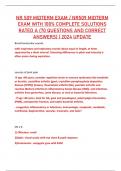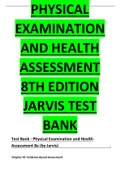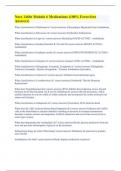NR 509 MIDTERM EXAM / NR509 MIDTERM EXAM WITH 100% COMPLETE SOLUTIONS RATED A (70 QUESTIONS AND CORRECT ANSWERS) | 2024 UPDATE Bronchovesicular sounds with inspiratory and expiratory sounds about equal in length, at times separated by a silent interval. Detecting differences in pitch and intensity is often easier during expiration. sources of joint pain -If age <60 years, consider repetitive strain or overuse syndromes like tendinitis or bursitis, crystalline arthritis (gout; crystalline pyropho sphate deposition disease [CPPD]) (males), rheumatoid arthritis (RA), psoriatic arthritis and reactive (Reiter) arthritis (in inflammatory bowel disease [IBD]), and infectious arthritis from gonorrhea, Lyme disease, or viral or bacterial infections. - If age >60 years, look for OA, gout and pseudogout, polymyalgia rheumatica (PMR), osteoporotic fracture, and septic bacterial arthritis. - congenital, inflammatory or infectious, immunologic, neoplastic, metabolic, nutritional, degenerative, vascular, traumati c, and toxic? CN 1 -6 1) Olfactory - smell 2)Optic - visual acuity with eye chart & pupil response 3)Oculomotor - conjugate gaze with EOM 4)Trochlear - conjugate gaze with EOM 5) Trigeminal - palpate masseter & touch face and have pt identify where 6) Abducens - Conjugate gaze with EOM CN 7 -12 7)Facial - Blow cheeks out, smile, frown, pucker lips 8)Vestibulocochlear (Acoustic) - Whisper test 9) Glossopharyngeal - Gag reflex 10)Vagus - say "ahhh". soft palate and uvula rise symmetrically 11) Accessory - shrug shoulders 12) Hypoglossal - Stick out tongue and move left to right epistaxis causes nosebleed - cause: trauma, inflammation, drying and crusting of the mucosa, tumors and foreign bodies Vesicular lung sounds soft and low pitched. They are heard throughout inspiration, continue without pause through expiration, and then fade away about one third of the way through expiration. Bronchial or louder, harsher and higher in pitch, with a short silence be -tween inspiratory and expiratory sounds. Expiratory sounds last longer than inspiratory sounds. tracheal sounds Loud, harsh sounds heard over the trachea in the neck Wheezes high pitched, shrill quality -means narrowed airway, COPD, bronchitis, asthma Rhonchi - Low pitched -sound from secretions in the large airways that may change with coughing crackles -intermittent, nonmusical, brief - Come from abnormalities of the lung parenchyma (pneumonia, inte rstitial lung disease, pulmonary fibrosis, atelectasis, heart failure) or of the airways (bronchitis, bronchiectasis






